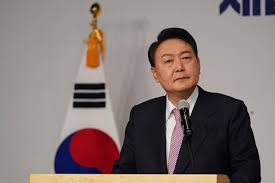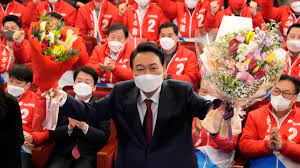Rightwing neoliberal Yoon Suk Yeol elected president of South Korea
Yoon Suk Yeol of People Power Party bagged 48.6% of the votes against ruling liberal Democratic Party candidate Lee Jae-myung’s 47.8%
According to the final results released by the South Korean National Election Commission on Thursday, the Neoliberal pro-free market Yoon Suk-Yeol- the candidate of the main conservative opposition People Power Party won a narrow victory in the South Korean presidential elections held on March 9.Yoon bagged 48.56% votes in a tightly
contested election defeating his liberal rival by a narrow margin. Lee Jae-Myung
of the ruling Democratic Party gained 47.83 %, and Sim Sang-Jung of the
progressive Justice Party won 2.37% of the votes.
The final
turnout was 77.1 %, or 34,071,400 voters among the electorate of 44,197,692
people. It was slightly lower than the previous election's 77.2 %in 2017. An
early voting, which was adopted in 2013 and first applied to the 2014 local
election in the Asian country, was held from March 4 to 5.
The young voters played important role in the victory of Yoon as they are worried about soaring housing prices, rising unemployment and widening gap between rich and rest of the society. The young people are finding it hard to afford decent housing, find decent paid jobs and raise families.
South Korea is the 10th largest economy in the world and considered as a successful story of capitalist development. Despite economic development and high growth, many in South Korea are not happy with their economic situation.
Yoon said he will rebuild the South Korea-U.S. alliance and strengthen the comprehensive strategic alliance between Seoul and Washington, vowing to actively push for the economic security diplomacy.
He also
pledged to build the South Korea-China relationship based on mutual respect
while expanding the future horizon of the South Korea-Russia relations.
Yoon is expected
to implement the neoliberal free market economic policies in South Korea. He wants
to further leberalise the economy and to reform the labour market. In the
election campaign, Yoon said that he will bring down the wages to spur growth
and investment. He is opposed to the government's economic intervention based
on his firm belief in neoliberalism.
"I'll
firmly safeguard the constitutional values of liberal democracy and market
economy," Yoon said at a forum in November 2021, vowing to listen
attentively to the voice of experts and the market.
Leading Marxist economist Michael Roberts in his latest article has said that "he supports ‘market-led approaches’, including job creation led by the private sector rather than government projects. He says he plans to cut ‘red tape’ for companies and to deregulate the virtual asset industry. He will lower capital gains and property ownership taxes to increase housing transactions. And he has proposed raising the tax threshold for cryptocurrency investments from the current 2.5 million won to 50 million won.
On the vexed housing issue, Yoon could not be more helpful to the rich and to property companies. He would abolish a planned new tax for people who earned 50 million won from stock investments, to be effective next year, and cut real estate holding taxes to increase housing transactions. Yoon says current property regulations must be eased and guided by “market principles.” And he vowed to create at least 2.5 million homes in the next five years, including 500,000 in the capital Seoul, presumably through private developments."
Yoon is
scheduled to be sworn in as the South Korean president on May 10.
March 9 presidential election boiled down to a two-way showdown between Yoon and Lee, who spent months slamming, mocking and demonising each other in one of the most bitter political campaigns in recent memory. Their fighting has aggravated the country’s already severe domestic divisions and stoked speculation that the losing candidate might face criminal probes over scandals that they’ve been linked to.
Critics say
neither Yoon nor Lee has presented a clear strategy for how they would ease the
threat from North Korea and its nuclear weapons. They also say voters are
skeptical about how both would handle international relations amid the
U.S.-China rivalry and how they would address widening economic inequality and
runaway housing prices.
Yoon says he
would sternly deal with North Korean provocations and seek to boost trilateral
security cooperation with Washington and Tokyo to neutralize North Korean
nuclear threats. He has made it clear that an enhanced alliance with the United
States would be the center of his foreign policy. Yoon said he would take a
more assertive stance on China.
On domestic issues, Yoon was accused of stoking gender animosities by adopting a Trump-like brand of divisive identity politics that spoke almost exclusively to men. He vowed to abolish the country’s Gender Equality and Family Ministry in an apparent bid to win the votes of young men who decry gender equality policies and the loss of traditional privileges in a hyper-competitive job market.
Khalid Bhatti














Post a Comment